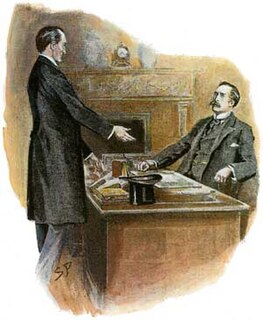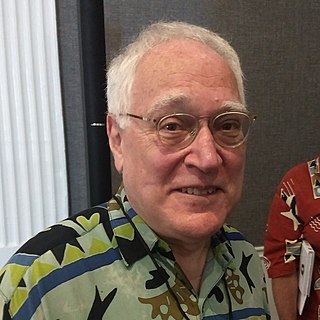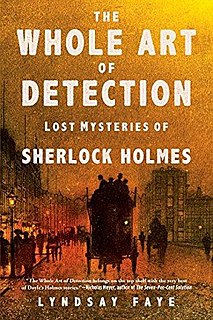
Sherlock Holmes is a fictional detective created by British author Sir Arthur Conan Doyle. Referring to himself as a "consulting detective" in the stories, Holmes is known for his proficiency with observation, deduction, forensic science and logical reasoning that borders on the fantastic, which he employs when investigating cases for a wide variety of clients, including Scotland Yard.

Professor James Moriarty is a fictional character and criminal mastermind created by Sir Arthur Conan Doyle to be a formidable enemy for the author's fictional detective Sherlock Holmes. He was created primarily as a device by which Doyle could kill Holmes and end the hero's stories. Professor Moriarty first appears in the short story "The Adventure of the Final Problem", first published in The Strand Magazine in December 1893. He also plays a role in the final Sherlock Holmes novel The Valley of Fear, but without a direct appearance. Holmes mentions Moriarty in five other stories: "The Adventure of the Empty House", "The Adventure of the Norwood Builder", "The Adventure of the Missing Three-Quarter", "The Adventure of the Illustrious Client", and "His Last Bow".

The Adventures of Sherlock Holmes is a collection of twelve short stories by British writer Arthur Conan Doyle, first published on 14 October 1892. It contains the earliest short stories featuring the consulting detective Sherlock Holmes, which had been published in twelve monthly issues of The Strand Magazine from July 1891 to June 1892. The stories are collected in the same sequence, which is not supported by any fictional chronology. The only characters common to all twelve are Holmes and Dr. Watson and all are related in first-person narrative from Watson's point of view.

The Case-Book of Sherlock Holmes is the final set of twelve Sherlock Holmes short stories by British writer Arthur Conan Doyle first published in the Strand Magazine between October 1921 and April 1927.

The Canary Trainer: From the Memoirs of John H. Watson is a 1993 Sherlock Holmes pastiche by Nicholas Meyer. Like The Seven Percent Solution and The West End Horror, The Canary Trainer was published as a "lost manuscript" of the late Dr. John H. Watson. In "The Adventure of Black Peter", an original Arthur Conan Doyle Holmes story from 1904, Watson mentions that his companion recently arrested "Wilson, the notorious canary-trainer, which removed a plague-spot from the East-End of London." This Wilson is not related to the eponymous character of Meyer's novel. Meyer's "trainer" is Erik, the principal figure of Gaston Leroux's 1910 novel The Phantom of the Opera. It is from this unchronicled tale that The Notorious Canary Trainers take their name.

The Baker Street Irregulars is an organization of Sherlock Holmes enthusiasts founded in 1934 by Christopher Morley. The nonprofit organization currently numbers some 300 individuals worldwide. The group has published The Baker Street Journal — an "irregular quarterly of Sherlockiana" — since 1946.

Traditionally, the canon of Sherlock Holmes consists of the 56 short stories and four novels written by Sir Arthur Conan Doyle. In this context, the term "canon" is an attempt to distinguish between Doyle's original works and subsequent works by other authors using the same characters.
The Sherlockian game is the pastime of attempting to resolve anomalies and clarify implied details about Sherlock Holmes and Dr. Watson from the 56 short stories and four novels that make up the Sherlock Holmes canon by Arthur Conan Doyle. It treats Holmes and Watson as real people and uses aspects of the canonical stories combined with the history of the era of the tales' settings to construct fanciful biographies of the pair.

Leslie S. Klinger is an American attorney and writer. He is a noted literary editor and annotator of classic genre fiction, including the Sherlock Holmes stories and the novels Dracula and Frankenstein as well as Neil Gaiman's The Sandman comics, Alan Moore's and Dave Gibbons's graphic novel Watchmen, the stories of H.P. Lovecraft, and Neil Gaiman's American Gods.
Adventures of Sherlock Holmes; or, Held for Ransom is a 1905 American silent film directed by J. Stuart Blackton for Vitagraph Studios. It was the second film based on Arthur Conan Doyle's Sherlock Holmes stories, following the 1900 Mutoscope trick film Sherlock Holmes Baffled, and is usually regarded as the first attempt to film a "serious" Holmes adaptation. The scenario was by Theodore Liebler based on elements of Conan Doyle's 1890 novel The Sign of the Four.

The New Annotated Sherlock Holmes is a series of three annotated books edited by Leslie S. Klinger, collecting all of Arthur Conan Doyle's short stories and novels about Sherlock Holmes. The books were originally published by W. W. Norton in oversized slipcased hardcover editions. The first two volumes containing the short stories were published on November 17, 2004, with the third volume containing the novels following a year later on November 17, 2005. Each volume was subsequently published separately on November 5, 2007 without a slipcase. This publication of the Sherlock Holmes canon has been called "definitive" and "a landmark in Sherlockian publishing." The books, like other Sherlockian works, assume an in-universe perspective—that Holmes and Watson are real persons, with Doyle merely being a literary agent—and some of the scholarship is only pseudo-serious.
Sherlock Holmes fandom is an international, informal community of fans of the stories by Arthur Conan Doyle featuring the fictional detective Sherlock Holmes. The fans are known as Sherlockians or Holmesians. Many fans of Sherlock Holmes participate in societies around the world, and engage in a variety of activities such as discussion, tourism, and collecting.

Sherlock Holmes of Baker Street: A Life of the World's First Consulting Detective is a 1962 novel by William S. Baring-Gould. The book purports to be a biography of Sherlock Holmes. It is considered to be the "definitive" biography of Sherlock Holmes.
The Baker Street Journal is a quarterly journal devoted to Sherlockiana published by The Baker Street Irregulars. Leslie S. Klinger has called it "the leading publication" in the study of Sherlock Holmes.

The Whole Art of Detection: Lost Mysteries of Sherlock Holmes is an anthology of Sherlock Holmes pastiche short stories by Lyndsay Faye. All but two of the stories have been previously published with 10 of the 15 stories were originally published in The Strand Magazine in slightly different form. The stories are divided chronologically into four sections: pre-Baker Street, the early adventures of Holmes and Watson, adventures during the "great hiatus", and the retirement years. Many of the stories are based on references in the Canon of Sherlock Holmes such as "Colonel Warburton’s Madness", a reference made in "The Adventure of the Engineer's Thumb".

Baker Street Babes is an-all female Sherlockian group who host the web's first all-female Sherlock Holmes podcast. There are eleven members of the group, including Edgar Award-nominated author Lyndsay Faye, a collective devoid of a president or a leader. They consider themselves "a bridge between older Sherlockians and young, tech-savvy enthusiasts" and they have been described as being "at the center of online Sherlock fandom."

The Adventure of the Peculiar Protocols: Adapted from the Journals of John H. Watson, M.D. is a Sherlock Holmes pastiche novel by Nicholas Meyer, published in 2019. It takes place after Meyer's other Holmes pastiches, The Seven-Per-Cent Solution, The West End Horror, and The Canary Trainer. It is Meyer's first Holmes pastiche in 26 years.
The Revenge of the Hound is a Sherlock Holmes pastiche novel by Michael Hardwick, originally published in 1987. It is Hardwick's second Holmes novel after 1979's The Prisoner of the Devil.













